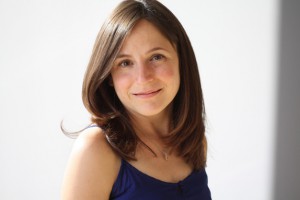 ed. note: Full Stop conducted this interview back in March. Since then, Swamplandia! was picked up by HBO and named one of the 10 best books of 2011 by the New York Times.
ed. note: Full Stop conducted this interview back in March. Since then, Swamplandia! was picked up by HBO and named one of the 10 best books of 2011 by the New York Times.
Karen Russell is a young writer of great imagination. She is the author of St. Lucy’s Home For Girls Raised By Wolves, a collection of short-stories, and Swamplandia!, a novel. Swamplandia! follows the Bigtrees, first seen in Russell’s short story “Ava Wrestles the Alligator,” a family who runs a tourist trap off the swampy coast of Florida. There they wrestle alligators for ferry-loads of mainlanders and merchandise their “tribe,” which is pitch-perfectly rooted in the worst of Americana.
The family, descendants of Ohio coal miners, applies bronzer for family portraits and wears headdresses- their patriarch is known as “Chief”. The three Bigtree children are home-schooled and run the attraction, while their mother, Hilola Bigtree, is the star of the show. Hillola’s sudden death, at the hands of no more beastly a fate than cancer, throws the attraction into turmoil. The crowds disappear and the Chief returns to the Mainland, in search of funding forSwamplandia!’s next incarnation, something he refers to as “Carnival Darwinism”. Assuredly, its even more ludicrous than their original production. Even more threatening than the figurative darkness that has engulfed the family, is the literal “World of Darkness,” a new attraction that is squarely aimed at the same rabble that used to patronize the Bigtree’s. Each child, in turn, leaves their home. Kiwi, the eldest, tries to raise money for the families’ debilitating debt; Ossie, the middle child, runs off to marry a ghost; Eva, the youngest and our protagonist, goes looking for her sister in what might be the underworld. And if the underworld exists anywhere, it’s probably in the Everglades. My review of the novel is here.
Ms. Russell’s stories are fantastic, funny, and sad, always whip-smart and extremely well crafted. Swamplandia! is a novel about a paradise lost, but remains still hopeful. As the narrator, Ava, says, “I like to think our family is winning.”
The fantastic elements help the reader believe in your stories perhaps even more than the realistic parts. There’s such rising action towards Ava and The Bird Man getting to the end of their journey and making us believe that something fantastic and magical is going to happen.
I think that we all share that with Eva. We all want to be the hero of our story-we all want that something uncanny, fantastic, sublime could happen, could be possible. And I was thinking too about, I guess it’s a childish wish, but she wants to have contact with the spirit of her dead mother. Nothing seems more uncanny than death. You know the story they tell about the Dredgeman where he’s literally ripped out of the Universe? I think that speaks to the horror and the shock of death, there’s nothing we can ever imagine to be more truly uncanny than that. More truly fantastic than the loss of someone that you love.
The novel doesn’t linger on the death of Hillola, it’s everyone dealing with her death through action.
She’s a huge absence in the book. There’s something about the ratio in the more fantastic and the more whimsical stuff in relation to the huge hole in their lives that their mother leaves. That’s something I love about George Saunders and Calvino, who use fantastic elements to underscore something really awful- something unspeakably huge like death.
What type of research did you do for the novel? Were you familiar with some of the depression-era history of Florida?
No, I wasn’t. It really made me wonder what I’d been doing for my whole education. I made it into my 20’s with a mad-libs blank about Florida history. I knew very little about that period. My home was on artificial bedrock that had been dynamited out of Biscayne Bay. The park that I call the Everglades is only 20% of its original size, and now it’s become a fantasy land – it’s Orlando. There was a lot that was really fascinating to me. Florida was really a backwater where outlaws and free slaves and all these marginalized people were living. I was reading about how when the recent mortgage crisis hit, all these planned communities became derelict and vine-covered in only a few months. That felt like a repetition of the original land-scam in the 20’s and 30’s where they got people to come to Florida from the North by selling them these farms. What a scam, right? They tell you about great soil and year-round growing season and you get down there and oh! It’s covered in primordial lizards and it’s underwater. But I don’t really think I’m the first to notice the parallel between the Great Depression and the mortgage crisis. I hope I do get some sort of honorary economics degree for the novel, though.
One thing that I really enjoyed about the book was the names of the characters, where do they come from?
Cubby Wallach, I think I had a sub-letter whose boyfriend was named Cubby, and I think that these names just float through my brain. But I grew up in Miami where everybody has some unusual name like “Osiris Smith”, where two cultures collide and you end up with some incredible names like, “Jesus O’Malley”. I’ve seen some strange and beautiful names. Griswalda, Delores, etc. I also just think a weird name is a great way to alert people that your world is a little off-kilter. I sort of love in Calvino there’s this story with a dinosaur where his name is unpronounceable- I’ve always admired that move in stories where it’s a signal that you’re not in Kansas anymore. It disarms readers. If you have a story where Dave Smith got into his Subaru, it’s just transcribing reality- but if you have some girl named Osseola, people keep reading. It’s an early flag that you’re in a different sort of world.
Did you switch between writing the alternating Kiwi and Ava segments?
The novel was a lot messier originally and the pacing needed to get straightened out. But you know what? Now I feel like this grifter whose inventing a mythology about how this book came into the world. It’s like the process was so painful that I’ve repressed it or something and am making it up. At a certain point I realized that I wanted two parallel journeys to the underworld, and they correspond to each other- like where Kiwi confronts his grandfather is when Ava encounters her mother’s absence, in the form of the empty sawgrass prairie. So at a certain point I had a long uneven draft and soon got them to rotate regularly and pretty evenly.
The novel is set during the early 90’s and reading it I was really thinking about Hurricane Andrew the whole time the Bird Man and Ava are on the water. I really thought that’s where they were heading.
Hurricane Andrew was really seminal for me, and no one has asked me about it yet in regards to the book. My house was destroyed, I was entering the sixth grade and my whole neighborhood was destroyed. My siblings were accusing me of somehow getting the hurricane in the novel somehow. We were pretty traumatized by it. We lost our photographs, our house- you could see the watermarks were near the ceiling. I think that when I was that age, I didn’t really have a sense of what was coming, there was just sort of a carnival feeling throughout Florida. Whatever strange, somber, glee precedes a tragedy because of the suspension of any ordinary law. Afterwards I just remember walking around during the eye of the storm. It was like a long hallucination- all the trees were uprooted, there were boats on the roofs of houses, and our neighbors found sharks in their dry-pool. It was the world uprooted. But I remember it as a really happy memory, too. Rebecca Solnit has this great book right now, Paradise Built in Hell, about how there’s no great vocabulary of this joy that can exist inside a tragedy- I think some of that energy is how close you become to people. I’ve never been closer to my family than during that time. We were never more threatened- we were all sitting in the bathtub together, and I remember being really happy. Probably because I was 11 and didn’t really understand the consequences of what was happening.
Does the young writer feel an obligation to go back to adolescence?
I feel the emotional stakes are really high for adolescents, but I try to sneak in a lot of language that is really beyond their years. I feel with Ava, the stakes are so high and the emotions are so raw, and she leads such a rich sensory life. When I was their age, I certainly didn’t have the language, I wouldn’t have been able to articulate what was going on. One of the challenges in the book was returning to that period and trying to voice feelings I had that had been voiceless.
It seems like the older characters, like the Chief, go unexplored.
I’m writing a new book with adult characters now, but with Swamplandia!, it was always a sibling story- part of the story for them is that they have a myth of their father and then are confronted with the reality that revises the story that they’ve always known. I feel in this book, the kids are savvier than their father- the chief is borderline delusional. I really like adolescent narrators to be these Sci-Fi Alien observers that are the ultimate outsiders- if you’re telling your own story, you are going to be unreliable, and rationalize your own actions. But if you see them from the outside, you get just the character.
Were there any attractions you based either The Underworld or Swamplandia! off of?
I think Gator-Land is going to sue me, I think that might happen. There’s a ton of places like that in Florida. I went to an Indian village a lot, with Tiki huts in the middle of the swamp. All of my family road-trips would be to Orlando, so a lot of time was spent in theme parks.
Your stories always seem one step removed from reality. When I was helping teach St. Lucy’s to college freshman last year, one of them was really surprised it wasn’t true.
That’s always really great when someone gets angry with me, for me, the fiction writer, making this stuff up. With this book, the ratio of stuff I made up to truth is way more skewed towards actual Florida history. But it’s funny because the details people pick out and say, “that was so inventive”, tend to be the ones I found while researching. Like the pilots who dispersed seeds through peppershakers over the swamp, everyone takes as proof of my great imagination. But I have to stop them and be like, “No, we did that.” I guess the fact that this is tough to distinguish is a big compliment. I really love outlandish fiction, like George Saunders, that could actually have happened somewhere on the planet. I like what Gary Shteyngart was saying about having to re-write his new novel because the outlandish things he was writing kept happening in real life.
What’s the next novel?
I’ve been working on it for a while now. It’s like a new relationship in the way you don’t want to talk about it too much when it’s just beginning, but I think now that it’s the real thing. It takes place in an imaginary town during the Dust Bowl. I was thinking about a lot of the photography from the Farm Security Administration, of all these migrant mothers. We have these iconic Dust Bowl images and there were these amazing pictures I found at the library with great stark images and captions and it looks like the apocalypse- a bleached out desert on an alien planet. I’m writing about if someone had a perverse level of fortune in the middle of the weather and misfortune. It would be a reverse Job-story, if they were spared instead. It’s changed a lot since then, but it’s somewhere along those lines.
How is writing a novel like growing a Red Seth?
That sounds so lewd, doesn’t it! One of my biggest fears is that someone would review the book and be like, “Paging Dr. Freud”. But nobody has seen it from that angle yet, hopefully- that I’ve written a book with a 13-year-old girl carrying around a red scaly thing that grows. But I definitely wasn’t thinking about it in those terms at all. I wish it was like growing a red Seth where its linear and it grew and you watched it become this possessed creature, but it was more like a grim sensation, a lot of expansion and retraction a lot of writing 50 pages about a character and then realizing it wasn’t working and having to bid them adieu. I was generating a lot of material about the library boat and then realizing that this material didn’t belong. It was a lot like some giant chia pet that I had to grow and then prune down again.
Did you know that after finishing St. Lucy’s that this individual story was going to become a book?
I’m still shocked that this became a book. I felt like the Ava-world was a world I could live in for a while, and I didn’t feel that way about any of the other stories in St. Lucy’s.
This post may contain affiliate links.







